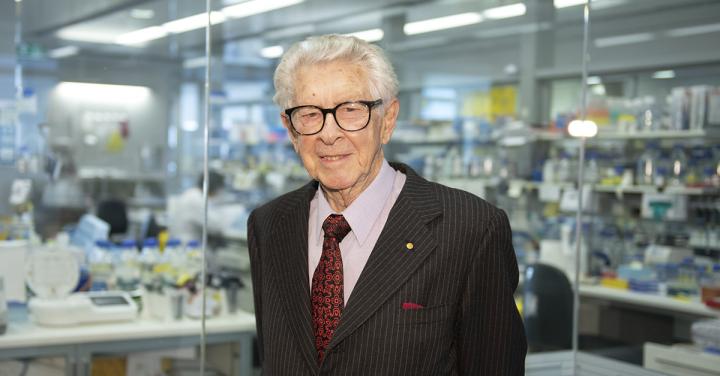
Credit: Walter and Eliza Hall Institute, Australia
Emeritus Professor Jacques Miller AC from Melbourne’s Walter and Eliza Hall Institute has won a Lasker Award, one of the highest international honours in medical research.
Professor Miller was joint recipient of the 2019 Albert Lasker Basic Medical Research Award with Professor Max Cooper of Emory University, US. They received the award for identifying immune cells called T and B cells, which have critical roles in our immune system.
The impact of this discovery on modern medicine is immense, and underpins many important innovations including vaccine development, organ transplants, identifying and treating autoimmune diseases and immunotherapy to treat cancer.
The Lasker Award is widely considered a predictor of Nobel Prize success. Professor Miller is the eighth Australian recipient of a Lasker Award, four of whom have gone on to receive the Nobel Prize for their research discoveries.
A seminal discovery
Professor Miller and Professor Cooper’s research in the 1960s investigated the functioning of the immune system, which protects us from infections. At the time, how the ‘adaptive’ immune system generates specific and long-lasting immune responses was still largely a mystery.
The research began with Professor Miller’s remarkable discovery of the immune function of the thymus in 1961, while a student at the Institute of Cancer Research, London. In 1966 he joined the Walter and Eliza Hall Institute and, two years later, published the seminal discovery of T cells and B cells.
Professor Miller said his laboratory identified the two types of immune cells and how they worked together during specific immune responses.
“Working separately, both Max Cooper’s and my laboratory simultaneously identified T cells, which are produced in the thymus, and B cells, which mature in the bone marrow. We then showed that these two cell types play different, but equally important roles: T cells stimulate B cells to produce antibodies which can protect against infection,” Professor Miller said.
“Individual T and B cells are hardwired to respond to a single, specific germ. During an infection, these cells activate and multiply to fight the infection. A subset of these T cells and B cells are then retained to ‘remember’ the invader and impart long-lasting immunity to future attacks.”
Impacting medical advances
Walter and Eliza Hall Institute director Professor Doug Hilton said Professor Miller was a very deserving winner of the Lasker Award.
“Distinguishing T and B cells was a truly ground-breaking discovery. The consequences of the research touch on a broad swathe of medical research today and much of the Institute’s ongoing research can be traced back to Jacques’ work,” Professor Hilton said.
“B and T cells are critical for immune responses to infection and drive many aspects of inflammatory diseases and inflammation linked to neurodegenerative disorders. Lymphoma, myeloma and lymphocytic leukaemias are all cancers of B and T cells; and T cells are at the heart of many immunotherapies that have had such success in treating cancers.
“It is fantastic to see Jacques recognised for his scientific achievement – which is just one highlight from his impressive career. Although Jacques officially retired in 1996, he is frequently seen at the Institute, contributing to current research projects and generously mentoring our researchers.”
Recognising scientific achievement
Professor Miller’s numerous national and international awards include the Japan Prize (2018), the Australian Prime Minister’s Prize for Science (2003), the Royal Society of London Copley Medal (2001), the Paul Ehrlich and Ludwig Darmstaedter Prize (1974) and the Gairdner Foundation International Award (1966).
Past Australian Lasker awardees include Institute alumni Sir Frank Macfarlane Burnet (1952), Professor Donald Metcalf (1993) and Sir Marc Feldmann (2003).
###
The Lasker Awards, sometimes referred to as ‘America’s Nobels’, are funded by the Albert and Mary Lasker Foundation. Professor Miller and Professor Cooper share an honorarium of $US250,000.
Media Contact
Vanessa Solomon
[email protected]
Original Source
https:/




